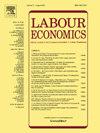搜索实验中保留工资的性别差异
IF 2.6
2区 经济学
Q2 ECONOMICS
引用次数: 0
摘要
调查数据显示,女性的预留工资低于男性。我们表明,在实验室搜索实验中,女性设定的保留工资比男性低14%至18%,这些实验控制了在调查中未完全观察到的因素,如薪酬分配和外部选择。这种性别差异——甚至控制了过度自信、偏好、个性和智力——导致女性比男性花更少的时间找工作,同时接受更低的工资。考虑到她们的风险偏好,更具风险容忍度的女性在搜索初期设定的保留工资相对于理论上最优的保留工资过低,从而降低了她们的收入。本文章由计算机程序翻译,如有差异,请以英文原文为准。
Gender differences in reservation wages in search experiments
Women report setting lower reservation wages than men in survey data. We show that women set reservation wages that are 14 to 18 percent lower than men's in laboratory search experiments that control for factors not fully observed in surveys such as offer distributions and outside options. This gender gap—which exists even controlling for overconfidence, preferences, personality, and intelligence—leads women to spend less time searching than men while accepting lower wages. More risk tolerant women set reservation wages that are too low early in search relative to theoretically optimal reservation wages given their risk preferences, reducing their earnings.
求助全文
通过发布文献求助,成功后即可免费获取论文全文。
去求助
来源期刊

Labour Economics
ECONOMICS-
CiteScore
3.60
自引率
8.30%
发文量
142
期刊介绍:
Labour Economics is devoted to publishing research in the field of labour economics both on the microeconomic and on the macroeconomic level, in a balanced mix of theory, empirical testing and policy applications. It gives due recognition to analysis and explanation of institutional arrangements of national labour markets and the impact of these institutions on labour market outcomes.
 求助内容:
求助内容: 应助结果提醒方式:
应助结果提醒方式:


